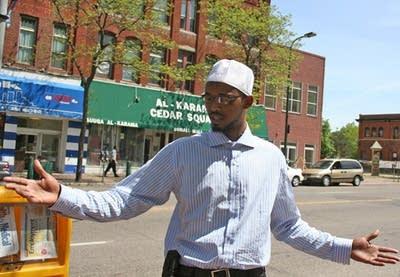A 48-year-old husband has been sentenced in connection with the 2019 killing of his wife within the City Heights Somali community, marking a significant development in the case that has drawn attention to domestic violence issues in the area. The verdict, delivered in a local court, sheds light on the ongoing challenges faced by immigrant communities grappling with such tragedies. Authorities and community leaders alike have responded to the sentencing, underscoring the importance of justice and support for victims of domestic abuse.
Husband Sentenced in 2019 Homicide of Wife within City Heights Somali Community
After a lengthy judicial process, the 48-year-old husband from the City Heights Somali community has been sentenced for the tragic 2019 homicide of his wife. The case, which gripped not only the local neighborhood but also the broader San Diego area, highlighted complex issues surrounding domestic violence and community safety. The verdict brings a measure of closure to a community shaken by the loss, underscoring the justice system’s role in addressing family-related crimes.
Key details of the sentencing include:
- Length of sentence: 25 years to life imprisonment
- Location: San Diego Superior Court
- Court remarks: Judge emphasized prevention of future domestic violence incidents
- Community impact: Strengthened calls for support services and awareness campaigns
| Aspect | Details |
|---|---|
| Victim Age | 35 |
| Incident Year | 2019 |
| Location | City Heights |
| Sentence | 25 years to life |
Legal Proceedings Highlight Domestic Violence Challenges in Immigrant Communities
In a poignant case that underscores the complexities of domestic violence within immigrant communities, a 48-year-old man was recently sentenced for the fatal stabbing of his wife in 2019. The incident took place in City Heights, a vibrant neighborhood noted for its dense Somali immigrant population. This case not only highlights the tragic outcomes of domestic abuse but also the cultural and systemic barriers that survivors often encounter in seeking help. Law enforcement officials and community advocates emphasized the urgent need for culturally sensitive support mechanisms tailored to immigrant populations.
Key challenges identified include:
- Language barriers limiting communication and access to resources
- Fear of legal repercussions or deportation deterring reporting
- Cultural stigma surrounding domestic violence within close-knit communities
- Limited outreach from social services and law enforcement agencies
To better understand these dynamics, authorities presented a brief overview during the proceedings:
| Aspect | Impact on Immigrant Victims |
|---|---|
| Legal Awareness | Low understanding of rights and protections |
| Community Support | Reluctance to seek help due to social pressure |
| Access to Resources | Limited availability of culturally competent services |
Community Leaders Call for Enhanced Support and Intervention Programs
Following the sentencing, prominent voices within the City Heights Somali community have strongly urged for increased resources to address underlying social challenges that continue to affect families. Community leaders emphasize the urgent need for culturally sensitive intervention programs aimed at preventing domestic violence and supporting victims before situations escalate into tragedy.
Key recommendations put forth include:
- Enhanced access to mental health counseling, tailored to community linguistic and cultural nuances.
- Expanded outreach through trusted local organizations to educate families on conflict resolution and violence prevention.
- Increased funding for safe spaces and emergency shelters specifically designed to serve immigrant women and families.
| Focus Area | Proposed Actions | Expected Outcome |
|---|---|---|
| Mental Health | Language-specific counseling, outreach campaigns | Improved emotional support and early intervention |
| Education | Workshops on domestic violence awareness | Increased community understanding and prevention |
| Safe Housing | Development of emergency shelters | Immediate refuge for victims at risk |
Recommendations Emphasize Culturally Sensitive Outreach and Victim Protection Measures
Community leaders and advocacy groups are urging law enforcement and social services to adopt outreach strategies that respect the cultural values and sensitivities of the Somali community in City Heights. They emphasize the importance of employing bilingual and bicultural liaisons who can build trust and encourage victims to come forward without fear of stigma or retaliation. These measures aim to improve communication, increase awareness of victim rights, and ensure resources are accessible to those impacted by domestic violence.
- Collaborative training: Sensitivity workshops for police and social workers tailored to Somali cultural norms
- Confidential support networks: Safe spaces where victims can seek help discreetly
- Community education: Outreach programs addressing domestic violence prevention and legal protections
| Recommendation | Purpose |
|---|---|
| Bilingual Outreach Staff | Enhance communication and trust |
| Cultural Competency Training | Improve response effectiveness |
| Safe Reporting Channels | Ensure victim confidentiality |
Victim protection initiatives are also being reinforced to address immediate safety concerns. This includes expanding access to emergency housing and legal assistance tailored to immigrant and refugee populations. Stakeholders advocate for stronger coordination between judicial systems and community organizations to facilitate expedited protection orders and survivor-centered case management. The goal is to create a supportive environment that empowers victims while respecting their cultural identity.
Concluding Remarks
The sentencing in this case brings a measure of closure to a tragic chapter in the City Heights Somali community, highlighting ongoing concerns about domestic violence and the need for continued support and intervention. As the community grapples with the loss, local leaders and advocacy groups emphasize the importance of resources and outreach to prevent similar tragedies in the future. The court’s decision serves as a stark reminder of the serious consequences of such crimes and the justice system’s role in addressing them.







